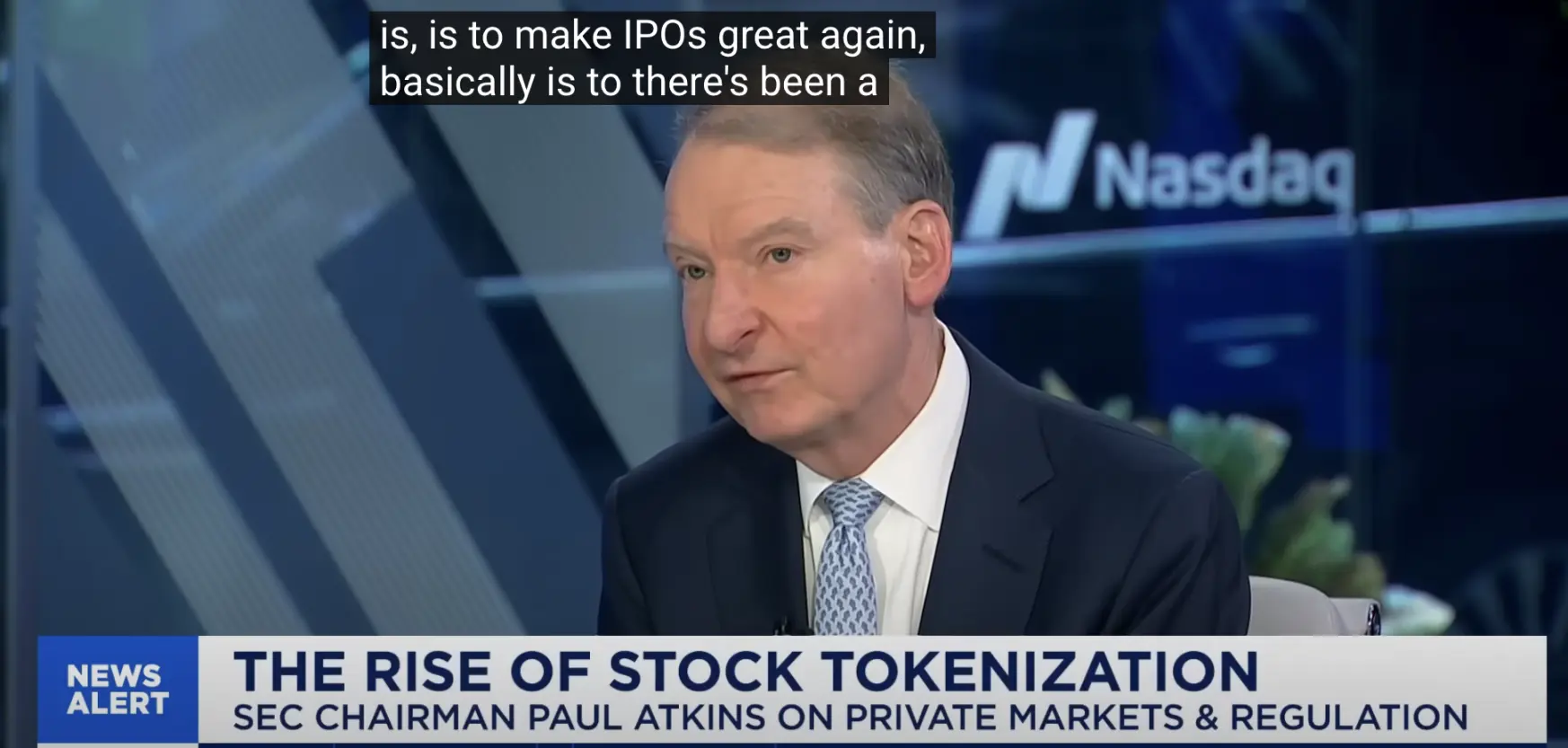
As the wave of stock tokenization sweeps the globe, Hong Kong has chosen to remain silent.
"In the short term, no companies will attempt to tokenize Hong Kong stocks," executives from three Hong Kong crypto companies revealed to the author.
Ten years ago, Hong Kong missed the best period for developing HKD and RMB stablecoins, significantly lagging behind USD stablecoins (annual trading volume of $28 trillion) and Euro stablecoins (annual trading volume of $2 trillion). Now, with the "stock tokenization" market emerging, Hong Kong has again chosen to miss out.
At the beginning of July 2025, U.S. regulators and corporate giants launched an innovative wave of "U.S. stock tokenization". Robinhood and Kraken officially announced the launch of their U.S. stock tokenization products, allowing ordinary users to buy U.S. stocks like Tesla and Apple on the blockchain without permission. Robinhood even introduced tokenized stocks of private companies like SpaceX and OpenAI, sparking market discussion. SEC Chairman Paul Atkins even directly appeared on CNBC to express support for stock tokenization technology.

However, on the other side of the ocean, Hong Kong crypto companies remain quiet.
The author consulted employees from compliance-focused crypto companies like HashKey and OSL, learning that while they are actively monitoring the situation, none have actually explored stock tokenization business.
Facing a market that, although in its early stages, has the potential to become the next trillion-dollar market after stablecoins, Hong Kong seems to have chosen to give up trying, even as U.S. stock tokenization attempts are in full swing.
Some practitioners can't help but ask: Why has Hong Kong, which has strongly supported cryptocurrency development in the past three years, chosen silence this time?
Why is Hong Kong Silent?
Missing stablecoins ten years ago, and now potentially missing stock tokenization. Why is Hong Kong, which supports ETFs, RWA, and stablecoins, hesitant about stock tokenization?
A Hong Kong crypto company executive told the author that some forward-thinking industry professionals had actually been actively promoting stock tokenization in Hong Kong.
"Two years ago, Xiao Feng (HashKey founder) was actively pushing the Hong Kong government to experiment with stock tokenization, and many industry executives were actively promoting it, but it didn't work out."
In Hong Kong, laws explicitly state that only exchanges recognized by the Hong Kong Securities and Futures Commission can legally operate stock trading markets, a structure that gives the Hong Kong Stock Exchange an "exclusive position" in stock trading. Attempting stock tokenization would inevitably challenge this long-standing exclusive position.
"The Hong Kong Stock Exchange has exclusive rights to stocks. No one wants to take the first step, break the exclusive rights, and become a historical sinner in the exchange's history."
"If you were the Hong Kong Stock Exchange, would you revolutionize yourself?" the executive asked.
With significant resistance and lacking motivation from regulatory bodies and the stock exchange itself, this might be the reason for Hong Kong's silence.
The U.S. situation is different. After Trump took office, current regulators strongly support crypto innovation. Whether it's USD stablecoins or U.S. stock tokenization, these efforts enhance the status of the U.S. dollar and U.S. stocks, making it easier for global users to bypass regulations and buy U.S. assets.
The U.S. financial innovation ecosystem is more vibrant and powerful. Whether it's Robinhood (the largest U.S. internet broker), Coinbase (the largest U.S. crypto exchange), or Solana (the largest U.S. public chain), they see themselves as challengers to traditional finance, with some even directly targeting NASDAQ. They have successfully pushed for regulatory relaxation on U.S. stock tokenization.
This is different from the previous stock tokenization cycle.
A Bybit insider noted that in the previous market cycle, there were early attempts like Mirror Protocol and FTX's tokenized stock projects. However, they faced unclear regulations, lack of sustained liquidity, weak interoperability with other DeFi protocols, and failed to establish stable relationships with compliant custody or infrastructure providers.
"Early setbacks should not hinder innovation in this field. With technological progress, clearer regulations, and enhanced infrastructure, tokenized stocks still have the potential to play a key role in the next financial revolution," the Bybit insider said.
Notably, this cycle's stock tokenization participants include not only powerful compliant institutions like Robinhood, Coinbase, and Kraken but also experienced crypto exchanges like Bybit, Crypto.com, and Gate that have navigated the crypto market for years.
Unfortunately, Hong Kong crypto companies may not be among these participants. The excitement of stock tokenization is destined to have nothing to do with Hong Kong in the short term.
Stock Tokenization: Potential Trillion-Dollar Market
Ten years ago, China missed the best opportunity to develop RMB stablecoins. Ten years later, Hong Kong will miss stock tokenization. Perhaps in ten years, people will lament why they didn't develop tokenized Hong Kong stocks, just as they now lament the missed opportunity with RMB stablecoins.
Ten years ago, people abandoned RMB stablecoins, enabling USD stablecoins to achieve a market cap of hundreds of billions and a trillion-dollar market. In 2024, USD stablecoins' annual trading volume of $28 trillion even exceeded the combined total of Visa and Mastercard.
Stock tokenization is the next important mass adoption track after stablecoins and a potential trillion-dollar market. This assessment is not without basis. Many industry professionals believe the tokenized equity market "could reach trillions of dollars".
Data shows that by 2025, the U.S. stock market value reached $52 billion, with only $20 trillion in circulating U.S. dollars. In terms of overall market size, U.S. stock tokenization has a broader market than USD tokenization. Currently, USD stablecoins (USD tokenization) have a market cap of hundreds of billions, while U.S. stock tokenization is only in the millions, less than a ten-thousandth of the former.
Beyond market size, global users have a strong demand for U.S. stock and USD tokenization. Currently, regions like Europe and China restrict people from freely buying U.S. stocks due to regulatory reasons. U.S. stock tokenization, being issued on public blockchains, naturally bypasses regulations, allowing all users to buy freely.
Moreover, U.S. stock tokenization can do things the traditional stock market cannot.
Andy from HashKey Tokenization believes tokenized stocks have more advantages than traditional stocks.
"For example, users can trade spot 24/7; users can trade on-chain derivatives 24/7; users can tokenize private company stocks, allowing ordinary users to buy shares of not-yet-listed companies like OpenAI, SpaceX, ByteDance, and Ant Group in advance; users from Europe, China, and other countries can bypass regulations to buy U.S. stocks, just like bypassing regulations to buy USD stablecoins," Andy said.
Currently, not only are compliant exchanges like Kraken, Robinhood, and Coinbase exploring U.S. stock tokenization, but exchanges like Bybit, Crypto.com, and Gate have also launched corresponding U.S. stock tokenization products, gradually forming a trend.
In Conclusion
Although the current U.S. stock tokenization market is only in the millions, just a ten-thousandth of the USD stablecoin market, many industry professionals believe this market should not be underestimated.
Established in 2014, Tether had only millions of dollars in transaction volume in its first three years. However, during the bull market of 2017, its transaction volume skyrocketed tenfold within a short year, reaching hundreds of billions of dollars. Today, its annual transaction volume has even reached tens of trillions of dollars.
The development path of US stock tokenization products may follow a similar trajectory. It is waiting for its ChatGPT moment, and the scenario where everyone buys US stocks on the blockchain might arrive suddenly, just like the stablecoin track.
When this moment comes, we hope Hong Kong will not miss the opportunity again.







